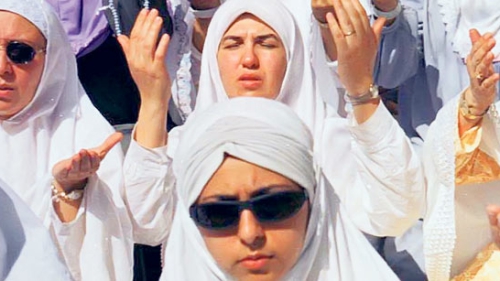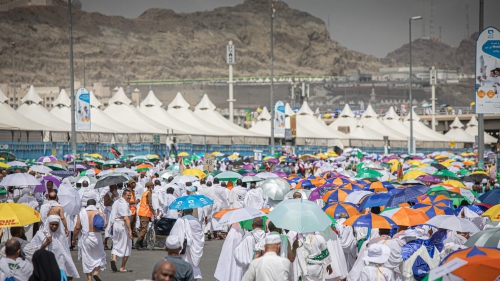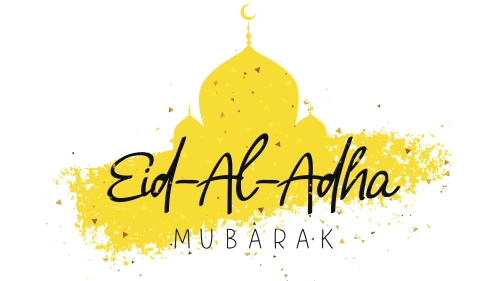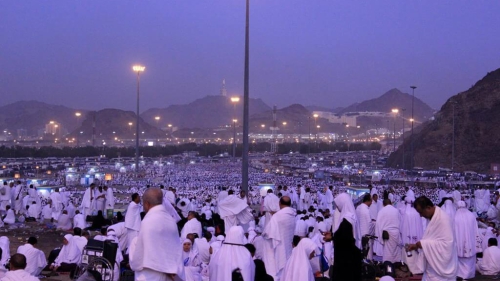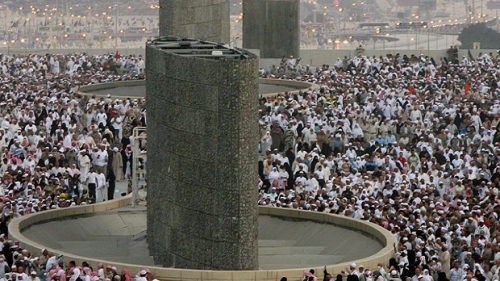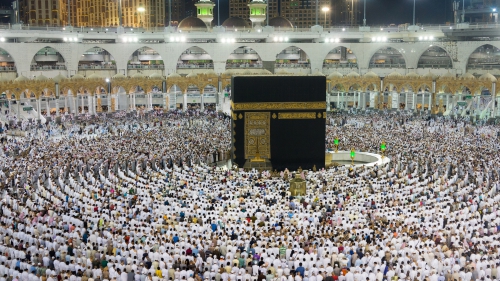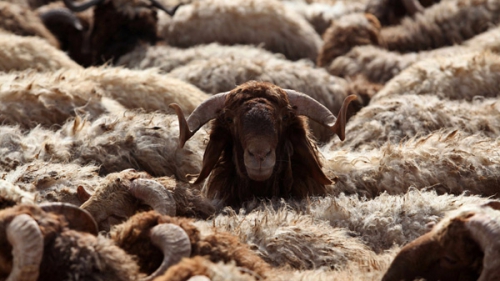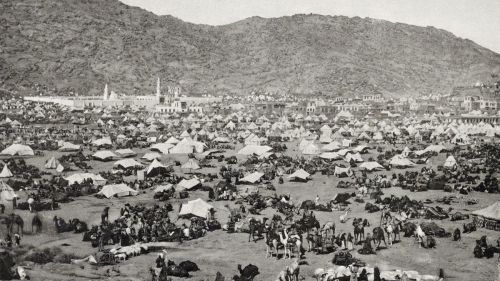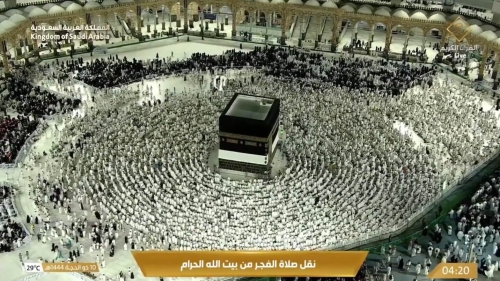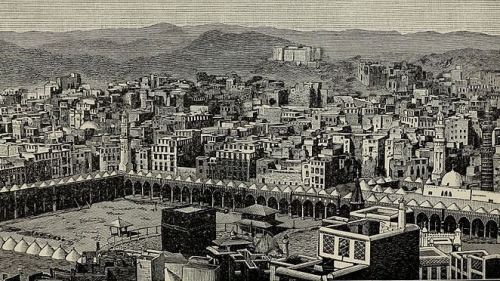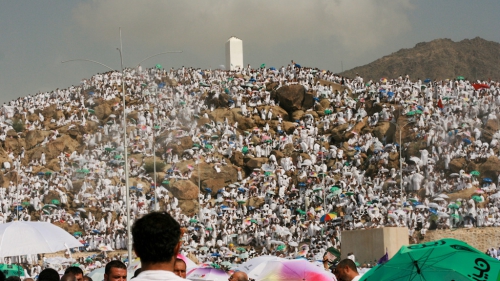Islamic Hajj and Biblical Haj Sukkot Today

Both the Holy Qur’an and the Holy Bible stress the religious importance of an annual pilgrimage to a sacred location (Hajj in Arabic, Hag in Hebrew). In Biblical times the Hebrew word Hag was pronounced Haj.
The Qur’an states: “So keep the three Haj (Pilgrimage) days and seven fasts when you return.” (2:196) and the Torah states: Three times a year all your men are to appear before the God of Israel. (Exodus 34:23)
More than two million pilgrims normally take part in the Hajj but this year only about 10,000 Saudi residents will perform the five-day ritual. Pilgrims are required to wear face masks and observe social distancing during a series of religious rites in Mecca and its surroundings. All those taking part this year were given temperature checks and placed in quarantine as they began arriving in Mecca last weekend.
Few Jews today realize that for more than 1.000 years, while Jerusalem's First and Second Temple--Bait ul Muqaddas/Beit HaMiqdash stood, the week-long Jewish festivals of Hag/Haj Sukkot and Hag/Haj HaMatzah were celebrated as a Hajj, a pilgrimage festival.
In the centuries after the Jerusalem Temple was destroyed; pilgrimage ceased. Today the overwhelming majority of Jews outside the Land of Israel live in Protestant countries where pilgrimage plays little or no role in religious life. Thus, it is very hard for most Jews to feel the tremendous spiritual uplift that can occur to pilgrims on the long path to, and amidst the mass tumult of, a uniquely holy and sacred place.
We can however see in the Muslim Hajj, some of the spiritual uplift that occurs when large numbers of people from all over the world travel to one holy place and join together in a traditional religious ceremony. Muslims in turn, can see some similarities, especially during Haj Sukkot, with the ancient Jewish practice of Haj ceremonies.
The Torah declares, “Celebrate Haj Sukkot for seven days after you have harvested the produce of your threshing floor and your winepress. Be joyful at your festival—you, your sons and daughters, your male and female servants, Levites, foreigners, orphans and the widows who live in your towns. For seven days celebrate the festival to the Lord your God at the place the Lord will choose. For the Lord your God will bless you in all your harvest and in all the work of your hands, and your joy will be complete. Three times a year all your men must appear before the Lord your God at the place He will choose: at the Haj of Matzot, the Haj of Weeks, and the Haj of Sukkot. (Deuteronomy 16:13-16)
The Haj of Sukkot was chosen by Prophet Solomon to dedicate the First Temple in Jerusalem. (1Kings 8; 2). Haj Sukkot was so important during the centuries when Solomon's Temple stood that the holy day week of Sukkot was often called simply "the Haj” (1 Kings 8:3; 8:65; 12:62; 2 Chronicles 5:3; 7:8) because of the very large numbers of Jews who came up to the Temple in Jerusalem,
On each of the first six days of Haj Sukkot it was traditional to circle the Temple alter while reciting psalms of Prophet David. On the seventh day of Sukkot the custom was to circle the Temple alter seven times. As the Oral Torah says: "It was customary to make one procession around the altar on each day of Sukkot, and seven on the seventh day." (Mishnah Sukkah 4:5).
Each of the seven circles done on the seventh day is done in honor of a prophet; Abraham, Isaac, Jacob, Joseph, Moses, Aaron and David, all of whom both Jews and Muslims revere. Muslims will see some similarities and some differences between the Jewish Haj and the Islamic Hajj.
For example, Islamic tradition urges one who goes on Hajj to remember his or her parents and other close relatives who have passed away with pious prayers; and make-up for them if they could not fulfill their obligations for hajj. And Jewish tradition has a special service on the last day of Haj Sukkot and Haj HaMatzot called Yizkor; to remember parents and other close relatives who have passed away with pious prayers.
The ritual slaughter of Qurbani (Korban in Hebrew) Halal/Kosher animals toward the end of all the ritual reenactments comes to teach everyone that: "Their flesh and their blood do not reach Allah, but the devotion from you reaches Him." (Quran 22:37). This is the same basic understanding that the Hebrew Prophets and the Rabbis gave to the offerings in the Temple of Solomon. "Prophet Muhammad was once asked by his Companions: "O Prophet of Allah! What is this qurbani?" He replied, "It is the Sunnah of your father Ibrahim.” To that I say: Amen.
With the destruction of the Second Temple by the Romans in 70 CE, the pilgrimage aspect of the week long harvest festivals of Haj Sukkot and Hajj HaMatzot began a gradual decline in the spiritual consciousness of the Jewish People. Most of the many thousands of Jews from foreign lands outside the Land of Israel; and the tens of thousands of Jews from all over the Land of Israel outside the city of Jerusalem; who used to came each year to celebrate the week of Haj Sukkot and Hajj HaMatzot in Jerusalem at Bait ul-Muqaddas, the furthest sanctuary; ceased coming.
Two generations later, after a second major Jewish revolt (132-135 CE) in the land of Israel, the Romans rebuilt Jerusalem as a pagan city filled with idols, That stopped all Jews from coming to the ruined site of the Jerusalem Temple--Bait ul Muqaddas/Beit HaMiqdash.
But even centuries after the destruction of the Temple, and the end of pilgrimage, generations of Jews repeated wonderful tales about pilgrimage experiences in Jerusalem and at the Holy Temple.
Crowded as Jerusalem was, there always seemed to be enough room to squeeze everyone in. Indeed, every year it seemed a continuing miracle that pregnant woman didn't suffer a miscarriage, a rain shower never quenched the fire on the alter, the wind never blew smoke from the fire into the crowds of worshipers, and no one was ever bitten by a scorpion or a snake. Most amazing of all, no one complained, “It is difficult for me to find lodging in Jerusalem”. (Pirkay Avot 5:8)
The wonderful fragrance of the Temple incense was so widespread throughout the city that brides in Jerusalem did not need to use perfume. (Yoma 39b) Monobaz, king of Adiabene, and his mother Queen Helene, who were well known converts to Judaism, contributed a very large golden candlestick that was placed over a Temple entrance. When the sun rose in the east, sparkling rays were reflected from it, and people knew it was time to recite the morning prayers. (Mishnah Yoma 3:10 and Tosefta Yoma 2:4)
Only a rare outside observer can experience even a small fraction of the spiritual feelings of those who belong to a pilgrimage tradition. One such observer, Mark Twain, wrote: “It is wonderful, the power of a faith that can make multitudes upon multitudes of old, weak, young and frail enter without hesitation or complaint upon such incredible journeys and endure the resultant miseries without repining.”
For Muslims, the Furthest Sanctuary is located in Jerusalem. “Glory to He Who carried His servant by night, from the Holy Sanctuary to the Furthest Sanctuary, the precincts of which We have blessed. so that We might show him some of Our signs. Surely He is the All-Hearing, the All-Seeing. (Qur'an 17:1) It is significant that the ruins of the Jerusalem Temple was the site of Prophet Muhammad's ascension—miraj-- up to the heavens.
One might say the destruction of the Furthest Sanctuary center of monotheistic pilgrimage in Jerusalem by the pagan Romans, was five and a half centuries afterward overcome by Prophet Muhammad's ascension (miraj) up to the heavens, and the soon to be realized removal by Prophet Muhammad of all the 300 idols from the paganized Ka'ba in Makka. The Ka’ba of Abraham
The Prophet Zechariah envisions a future time when God helps all humanity to establish worldwide peace. All the nations in the world may then travel to Makka and Jerusalem to worship God. Then during Haj Sukkot, Jerusalem will welcome both Jews and non-Jews, even including those who were previously Israel's enemies: “Then the survivors from all the nations that have attacked Jerusalem, will go up year after year to worship the King, the Lord Almighty, and to celebrate Haj Sukkot.” (Zechariah 14:16)
Just as the Ka'ba has always welcomed all Muslims from all the nations of the world, who answer the call: “Call upon the people for Hajj. They will come to you on their bare feet, or riding any weak camel, and they will come to you from every far desert. (Qur'an 22:27).
Topics: Hajj, Interfaith Channel: Hajj - Day 3
Views: 2202
Related Suggestions






